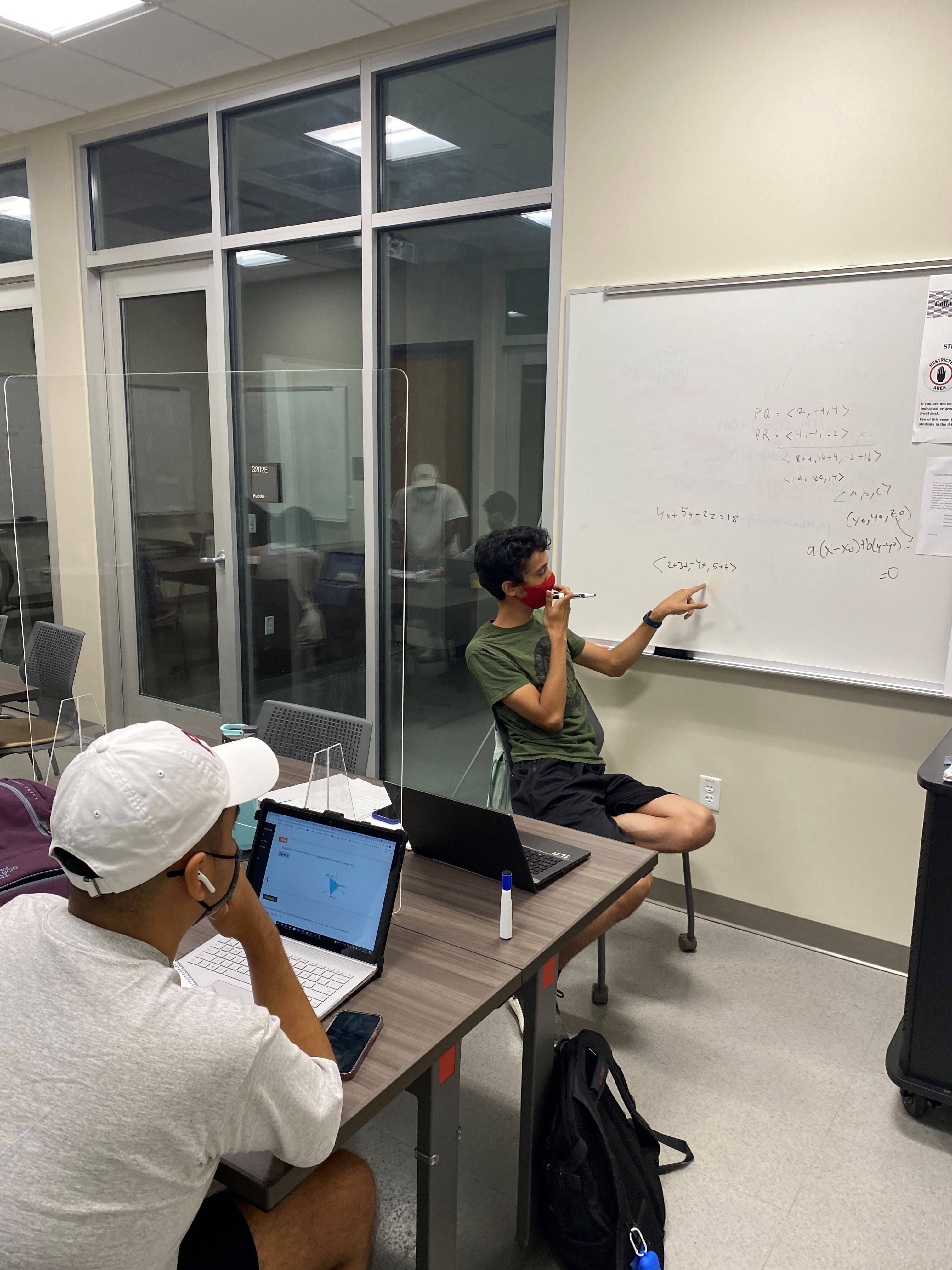
It is time to consider how you are thinking about an exam. Remember that exams measure what you can demonstrate about your learning thus far in a course of study, not your worth as a person.
First, put the exam in perspective. Determine the value of the test or exam in terms of the course grade from your syllabus; calculate your existing grade in the course and determine what grade you require to reach a certain objective in your course. When you calculate your standing, assume you will continue at least as well as you have so far in the course. Figure out what grade you’ll need on the exam in order to get the grade you would really like in the course. Also, figure out what your final grade will be if you continue with your present level of achievement. Sometimes exams are worth relatively little compared to the total for the course and so it may not be worth getting overly worked up about this exam. (Some exams, of course, are worth relatively more and should be approached accordingly, with greater time allocated and careful self-testing in preparation.)
After calculating their existing grade, some students actually find out that they are doing better than they thought they would. Some find a concrete goal in terms of a grade to shoot for on the exam and this helps them focus and begin studying with better concentration.
Know that you know what you know
- Much of exam anxiety comes from a fear of poor performance. If you can test yourself adequately prior to an exam and go in with the knowledge that you do know your stuff, you might find your anxiety diminished.
- Some anxiety is normal in an exam situation. In fact, some would say that to a degree, anxiety is facilitative of sharp concentration and alertness. When anxiety begins to impede your ability to perform to your ability, then it may be time to seek further help with it. If you find your anxiety to be extreme and accompanied by headaches, nausea, feelings of despair, shaking and trembling, or blanking out, then it might be worth looking into services for reducing stress and anxiety at our campus Counseling Center. The relaxation strategies and de-stressing exercises they can provide take time to develop and will probably be most productive for exams a few months down the road, given a few months of diligent practice.
- Symptoms of stress or anxiety can be worsened by drastic changes in sleep and eating routines, but they can be diminished with some physical activity like walking, running, swimming, or other forms of exercise.
- Breaking the study into smaller, one hour, or half hour, time units and inserting a break in between the sessions of study can be helpful in maintaining productive activity and providing a much-needed rest or time-out. The few minutes break offers you a chance to stretch, it allows you to focus and concentrate on a reasonably sized package of information and allows for some sense of progress on a regular basis.
- If you're very short of time, you might try focusing the bulk of your time on areas that need work rather than on those which you already know and can remember well. This way you can cover more of the course material. Though some people experience a little anxiety from working through the hard stuff, many feel that this strategy offers a chance for greater effectiveness and course material coverage.
- Beware the frantic student! It is hard sometimes to establish a controlled outlook for an exam, but it is easy to lose this outlook when you come into contact with somebody who is very anxious. The natural habitat of this kind of highly stressed individual is the main entrance to the exam room, just before an exam begins, trying to learn those last bits of information before the exam. If this is you or if this scenario seems familiar to you, then you might want to be aware that this may raise your anxiety at the worst possible time. Beware of picking up on the concerns and stress of other students. Probably we pick up more stray anxiety than we need to. If you review minutes before the exam and this helps you, then you might want to do so just out of range of the exam room.
- Try to eliminate negative self-statements such as, "I'm going to fail this exam for sure because I'm not smart enough." Negative statements work to convince us that they are accurate and this has an impact on our behaviors and self-concept. This low self-concept, in turn, may limit our ability to perform to standard on an exam. Replacing negative statements with genuine positive statements like "I'm studying hard and I did well during the semester, I should do well on this exam" may help curb anxiety and bolster your sense of confidence.
- In general, test and exam anxiety is often marked by a generally negative point of view. As you are working, try to repeat positive affirmations. Remind yourself of the positive experiences you may have encountered thus far in the course and tell yourself that your hard work will pay off. Tell yourself you can do it. You might find it helpful to remind yourself of the elements of the course that you do know; focusing only what you are not sure of only raises your anxiety.
- Don’t catastrophize. Try to focus on the task at hand. That is, focus on the activities of studying for and responding to questions on the exam rather than on potential negative consequences. Catastrophizing - i.e., focusing on grim forecasts of future jobs, lifestyle and so on, are more likely to raise anxiety than to help you control it.
- Some students feel anxious only during the exam or test. Some ways of reducing anxiety during the test follow: peruse the whole exam to discover which questions you are able to do with relative ease and plan to do these first. The result is likely to be a little more confidence and the comfort of knowing that there are no easy marks that you missed on the exam.
- Examine the marking scheme of the test or exam and plan to divide your time evenly among the available marks of the exam; e.g., spend ten percent of your time on ten percent of the marks for the test. While you may not stay strictly with this limit, it is worthwhile to know how many minutes you should spend per percentage point in the exam. Following this guideline gives you a sense of progress and feedback about how you are doing. It is important to keep track of your time so that you have an opportunity to answer all questions: after all, it is may be better to give a 75% answer on all questions than perfect answers on 50% of the exam.
- Some students even find it helpful to set mini-breaks at specified points during the exam during which they close their eyes, relax their hands and do deep breathing exercises. Even thirty seconds can help bring down your symptoms of stress if you use one of the various relaxation strategies.
- At all times, try to focus on the process of answering the question rather than on the end result.
Concentration skills that build your confidence to pass your exams

- Discuss your course work with other members of the class. By discussing the course focus and ideas related to the course, you are likely to determine some fairly common ground regarding the important aspects of the course to be tested. This may also give you an ideal chance to discover other points of view about the course ideas and focus. Group study is an excellent way to prepare for exams!
- Identify your areas of concern early in the semester and check them out. Often those who feel uneasy about exams are those who have discovered that they have gaps (large or small) in their understanding. By examining concepts which are unclear as the course proceeds, you reduce these gaps and build your confidence along with the knowledge of the course.
- If you feel anxious because of the poor state of your notes, you might try borrowing a friend's notes to fill in where there are gaps in your notes or use a tape recorder to keep up with professors who don't allow questions or who move too quickly. At all times try to keep your notes organized by date and look for the main ideas for each lecture as they relate to the course outline. Notes that you make from the text should reflect the organization of the ideas presented in the text. Consider using the Cornell style of notes which includes a margin for questions, comments, and key words which are used to trigger larger chunks of information. Finally, don't leave your notes until the end of the term to find that your notes are incomplete: instead, review the notes regularly through the term to clarify and complete them and then review the portions which are not clear with the professor, TA, or a classmate.
- Some people like to keep a pad of paper nearby as they work so that they can jot down or write out interruptive thoughts and distracting ideas. By doing this, you don't risk worrying that you will forget about these tasks, and you acknowledge that the concerns are important enough to warrant attention, but not so important that they must come before your work.
- It is often a good idea to "park" ideas that are bothersome and tend to distract. This idea involves setting a time when you will deal with a particular problem or concern and leaving it behind temporarily while you focus on other things.
- Try to determine a clear goal for what you want to accomplish for the learning session. This may assist you in focusing your attention on the specific tasks at hand, one by one, and provide you with important feedback about your progress.
- Try to focus on the task at hand and avoid looking into the potential longer term consequences of doing well or poorly which often leads to catastrophizing. Try to maintain an "I'll try to do the very best I can under the circumstances" attitude rather than an "It must be perfect" one.
- Do the most important tasks first so that you can know that anything else that comes to mind as a distraction is less important than the thing you are doing.
- Learn to recognize when a distracter is more important than the task you're presently doing. Also, learn to deal directly with the cause of that distracter whenever possible. Sometimes by removing the cause of a major distracter, it is possible to save time that would be wasted worrying later on.
- Try to work for a set period of time so that you know an end point is in sight. Restlessness sometimes gets worse when it seems that the work you are doing has no end in sight.
- Try to maintain a regular place for study which is free of your bigger distractions, such as your roommates, our cell phone, social media, the TV, the fridge, and so on. Keep your work space free of clutter and try to keep it dedicated to the task of study. Reading on the bed, for example, is probably not a good idea for good concentration. Working at a desk that you always use for such purposes will support better concentration. Have all your books, notes and working tools available. Needing to get up to search for lost or misplaced items can add to distractions.
- To reduce the anxiety associated with preparing to study you might begin by organizing your books and workspace to aid you in keeping your desk free of distractions and focusing on the task at hand. You might also plan time for "warming up" as part of your study routine. To do this, begin with something that's familiar to get started. As well, it sometimes helps to review the good results of the past to put yourself in a confident frame of mind.
- To reduce anxiety associated with the time following a study session, you might take a physical break to help you reduce the symptoms of stress and to peak your alertness and energy. You might also want to end each study session with an overview of a section to boost your sense of completion and confidence. As well, you might find studying early in the semester to be less anxiety-provoking because of the reduced amount of last-minute study you have to do.
- Adapted from Learning Skills Program, Counseling, and Development Center, York University
